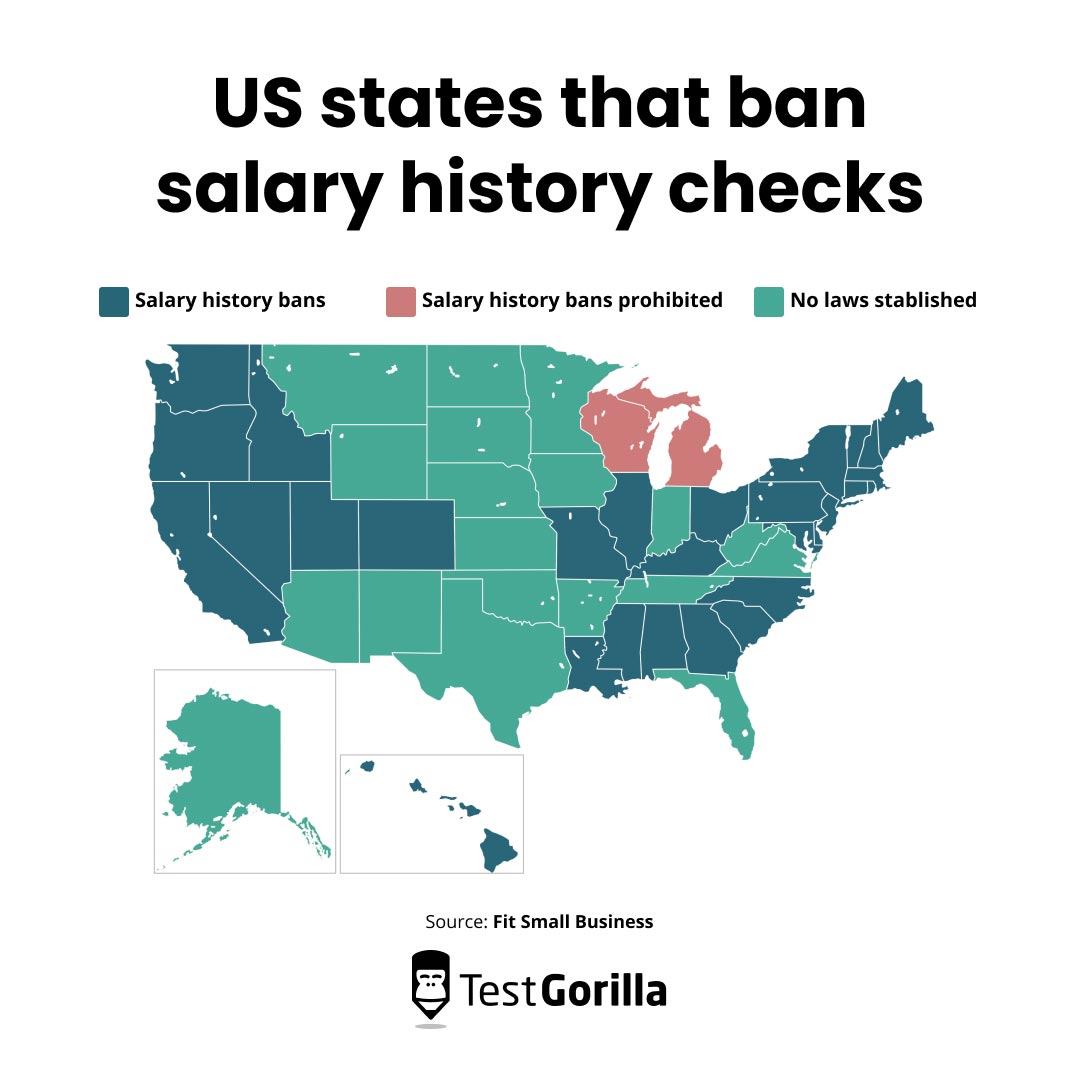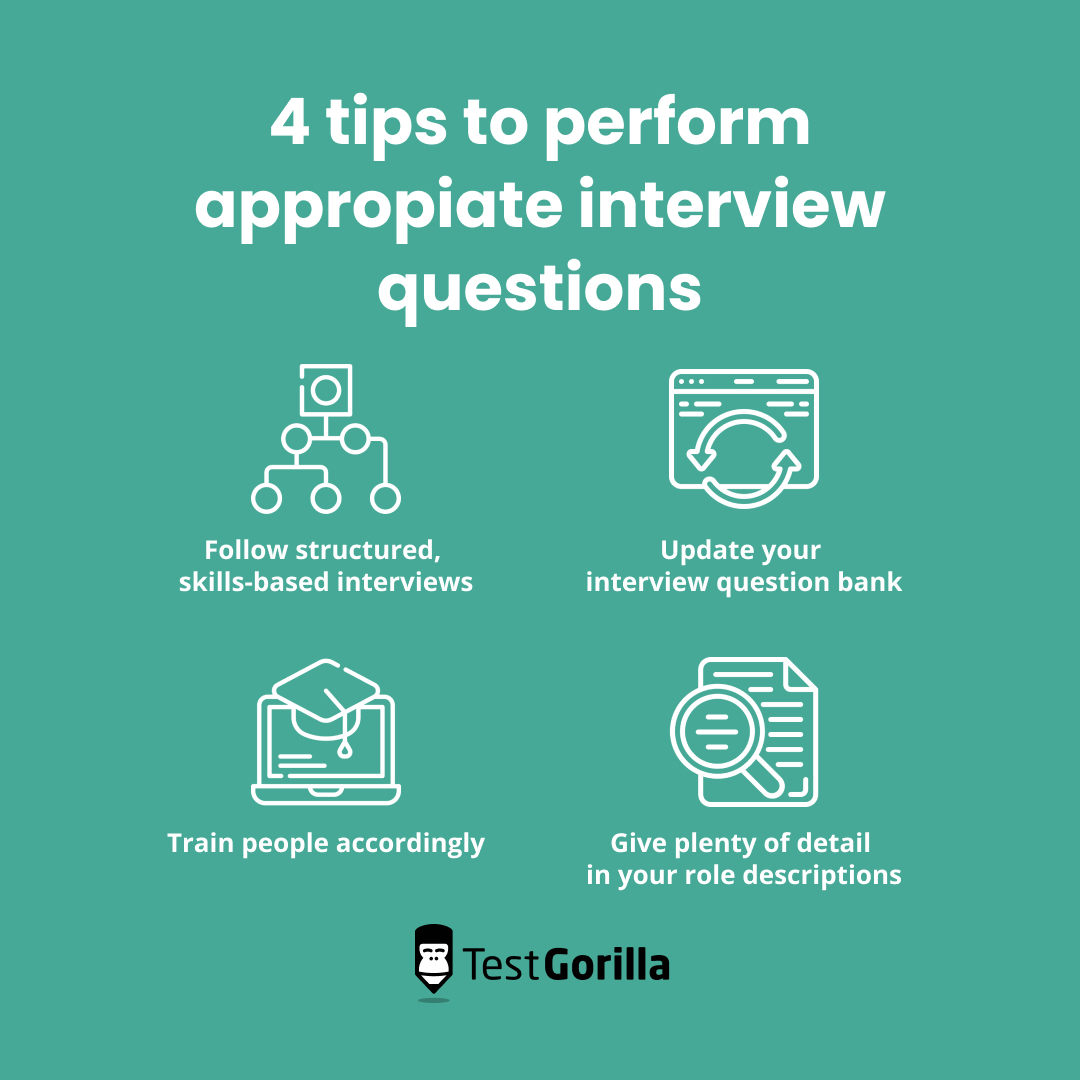74 illegal interview questions you should never ask candidates: A complete guide
Asking insensitive or inappropriate questions of your candidates does more than just insult the people you’re interviewing.
It’s possible to break the law simply by asking the wrong interview questions.
You risk harming your professional reputation, facing potential discrimination lawsuits, and receiving investigations from the US Equal Employment Opportunity Commission, or EEOC.
It’s easy to make a mistake if you’re unaware of what you can and can’t say.
Thankfully, as scary as this sounds, it’s easy to familiarize yourself with illegal interview questions so you don’t slip up.
Using skills-based questions during hiring is one step that can help you avoid harming your brand or running afoul of the law.
This guide explores which questions you should never ask in an interview, why, and how you can avoid making potentially costly mistakes.
Disclaimer: The information contained on this webpage is provided for informational purposes only and should not be construed as legal advice on any subject matter. If you have any questions on illegal interview questions in your area, please consult with a lawyer.
What are illegal interview questions?
Illegal interview questions are those that are deemed discriminatory by the EEOC, based on several pieces of important US legislation.
Interview questions about topics – such as gender, age, religion, political affiliation, race, or disability – can all be illegal, regardless of your intent.
Employment laws to reference when considering illegal questions in an interview
Interview question laws in the US largely revolve around equality legislation that enforces federal laws and is overseen by the EEOC, which was born from the Civil Rights Act of 1964.
The EEOC aims to keep workplaces fair and inclusive and to prevent unlawful discrimination. They guide federal agencies and intervene in cases where people make allegations against employers.
There are three main pieces of legislation to consider when conducting interviews:
Title VII of the Civil Rights Act of 1964
Age Discrimination in Employment Act, ADEA
The Americans with Disabilities Act, ADA
Here’s how each of these acts affects US employment law:
1. Title VII of the Civil Rights Act of 1964
Title VII of the Civil Rights Act refers to the prohibition of employment discrimination based on sex, color, race, national origin, and religion. The Title received amendments in 1991 and 2009 to bring it up to speed with modern practices.
2. Age Discrimination in Employment Act of 1967 (ADEA)
ADEA prevents employers from discriminating against employees 40 or older based on their age, specifically referring to areas of employment such as hiring, firing, promotion, payment, privileges, and general terms and conditions.
3. The Americans with Disabilities Act of 1990 (ADA)
The ADA promotes disability inclusion in the workplace and prohibits discrimination against people with disabilities in public areas. ADA offers disabled people similar civil rights protections to those found under Title VII of the Civil Rights Act.
This legislation received updates via the Americans with Disabilities Act Amendments Act of 2008, or ADAAA. This act changed disability definitions for private employers with 15 or more employees, agencies, and government bodies.
Why should you avoid asking illegal interview questions?
In addition to being insensitive, many interview questions are illegal because they have no actual bearing on how applicants perform in their roles.
They feed harmful unconscious biases and, therefore, put many candidates at an unfair disadvantage.
For example, it’s illegal to ask questions regarding:
Gender
Gender identity
Race
Religion
Color
Ethnicity
Sex
Sexual orientation
Disability
Citizenship status
Nation of origin
Age
There are some legal and moral exceptions that we explore further down.
Employers using questions that are illegal to ask in an interview risk referrals via the EEOC and potentially face discrimination lawsuits from candidates.
Asking sensitive or borderline discriminatory questions further damages the reputation of the company giving the interview. An interviewer asking such questions risks their job and their livelihood.
What’s more, candidates feel awkward and put on the spot when approached with inappropriate and irrelevant questions. Letting these questions slip into your interviews contributes to a negative candidate experience, ultimately driving top talent away.
74 illegal interview questions to avoid (plus 26 legal alternatives you can ask if they’re relevant to the job)
We've compiled a list of categories covering 73 illegal question examples to help you avoid discriminating against job applicants, and 26 you could ask depending on the scenario.
Let’s dive in.
What are illegal questions to ask in an interview? A quick summary
Illegal question category | Illegal question example | Legal alternative question |
Age | “When were you born?” | “Can you prove your age with ID? – only in roles where applicants need to be legal adults |
Race | “Are you a minority?” | No legal alternative |
Ethnicity | “Where are your parents from?” | No legal alternative |
Color | “Are you white/black?” | No legal alternative |
Gender and gender identity | “Are you a man or a woman?” | No legal alternative |
Sex | “Were you born a man or a woman?” | No legal alternative |
Sexual orientation | “Do you have a girlfriend or boyfriend?” | No legal alternative |
Country of origin and place of birth | “Are you an immigrant?” | “Do you have the legal right to work in the US?” |
Religion | “Do you believe in God?” | No legal alternative |
Political views | “Who did you vote for during the last election?” | No legal alternative |
Disability | “Are you disabled?” | “Can you confidently and safely perform all the duties required?” |
Marital status | "What does your husband/wife do for a living?" | “Do you have a preferred work schedule?” |
Family status | “Does your childcare clash with your ability to work?” | “When can you work?” |
Pregnancy | “Do you plan on having children soon?” | “Do you need any additional support to settle into the role?” |
Salary history | “How much did you earn in your last job?” | “What’s your expected salary for this position?” – depending on your state’s laws |
Arrest and convictions record | “Have you ever been arrested?” | No legal alternative, ask for details via an application form |
Height and weight | “How tall are you?” | “Do you require any specific support when working in this role?” |
Military service | “Why were you discharged from the military?” | “What training did you receive in the military?” |
Work availability | “Are you free to work weekends, or do you have commitments?” | “When are you available for work?” |
Alcohol and drugs | “Do you have a drug or alcohol problem?” | “Are you able to carry out the requirements of this role safely?” |
1. Age
The ADEA prevents you from asking age-related questions unless they directly relate to someone's legal ability to perform the job.
Some potentially insensitive and illegal questions that could risk age discrimination:
What year were you born in?
How old are your children?
When did you graduate from high school?
Do you have any grandchildren?
When did you first start working for a living?
Exceptions
Depending on the role, you can ask for someone's age and proof of ID. For example, if your interviewee is applying for a job to sell alcohol or tobacco, they need legal recognition as an adult.
The legal definition of adulthood varies by state – always consult your state laws for confirmation.
In scenarios such as these, you could ask:
How old are you?
Can you prove your age with ID?
Consider capturing this information with a questionnaire your candidates fill out before the interview stage, and make presenting ID part of the hiring process.
2. Race
The race of your employee refers to physical characteristics linked to biological heritage. This can include skin color and hair.
Asking interview questions based on race insults candidates, damages your reputation, and stunts diversity in the workplace – limiting the size of your applicant pool.
Avoid asking all questions about race, including the following:
What is your race?
Are you a minority?
What race is your spouse or partner?
3. Ethnicity
Ethnicity differs from race in that it refers to cultural or tribal identity rather than biological characteristics. There are no direct connections with race or color.
You should not ask pointed questions of your candidates just so that you can hit DE&I targets. Instead, naturally ingrain diversity and inclusion in your hiring practices to build a fairer approach.
Illegal ethnicity-focused questions include:
What ethnicity are you?
Where are your parents from?
Where does your accent come from?
4. Color
Although many people use color and race interchangeably, “color” refers purely to skin pigmentation alone. Race can refer to other characteristics shared by people with close biological ancestors.
You can’t ask any questions regarding color, such as:
Are you white/black?
What color are your parents?
Have you worked with people of other colors before?
5. Gender and gender identity
Your gender is part of your identity; unlike sex, it is non-biological. Gender can be fluid and doesn't always comply with the societal constructs of “male” and “female.”
Keep clear of the subject – for example, you can’t ask:
What gender do you identify as?
Are you a man or a woman?
We usually hire men/women for this role. Can you handle this as a woman/man?
Avoiding these questions helps promote a trans-inclusive workplace and broadens your hiring pool.
6. Sex
Sex refers to biological features such as hormonal makeup and reproductive systems.
It’s illegal for interviewers to ask the following:
Were you born male or female?
What’s your sex?
7. Sexual orientation
Never ask direct questions about sexual orientation or associated questions that might reveal these details. For instance, you don’t want to ask about a candidate’s living situation.
It’s illegal to ask questions such as:
What is your sexual orientation?
Do you have a girlfriend or a boyfriend?
Are you heterosexual/homosexual/bisexual?
8. Country of origin and place of birth
Provided your candidate’s paperwork confirms they can legally work in the US, asking about their place of birth and country of origin holds zero relevance in an interview.
You’re not allowed to ask:
Where are you from?
Where did you grow up?
Where are your parents from?
Are you an immigrant?
Can I see your birth certificate?
Is English really your first language?
Exceptions
You can ask the following legal questions to verify an applicant’s ability to work in the US (which you must do to comply with immigration laws):
Do you have the legal right to work in the US?
If we decide to hire you, can you show proof of your work visa or U.S. citizenship?
9. Religion
Asking questions about someone’s religious practice suggests you are positively or negatively biased against specific faiths.
Some companies ask about religion out of concern for working availability, but we cover how to tactfully approach that topic a little further down.
Don’t ask candidates any illegal questions regarding religious affiliation, which might include:
Do you observe a religion or any religious holidays?
Are you religious?
Do you attend a church?
Who is your local pastor?
Do you believe in God?
10. Political views
Asking any political questions of your applicants during an interview suggests you might hire or reject them if their affiliations differ from your own.
Unless you’re hiring for a specific political party, it’s an irrelevant ask.
Even then, asking these questions for roles, such as a political campaign officer, should start and end on application forms – interviewing should focus on addressing talent.
You should not ask:
Who did you vote for during the last election?
What are your views on [politician] or [public figure]?
I think [political opinion], do you agree?
Who are you voting for?
11. Disability
ADA and ADAAA prevent employers from making hiring decisions based on physical and mental conditions.
Asking people about disabilities or querying medical history is insensitive and suggests you care little about giving support if they need it.
You break the law if you ask questions such as:
Have you ever been injured at work?
Have you ever claimed disability compensation?
Are you disabled?
Do you take prescription medicine for any medical conditions?
How often do you see a doctor?
Exceptions
If a job requires physical work, you are permitted to ask candidates whether or not they can properly carry out what’s expected of them.
Make sure to list all the general duties and physical responsibilities in job advertisements.
At an interview, consider asking this job-related question:
After reading the job description and its responsibilities, can you confidently and safely perform all the duties?
To be even more inclusive, you could make special accommodations for disabled applicants during skills testing during interviews.
12. Marital status
Asking someone about their marital status is considered profiling and unnecessary prying.
The EEOC discourages the following questions because they can lead to discrimination:
Are you married?
Do you live with anybody?
Are you planning on getting married?
What does your husband/wife do for a living?
How long have you been single?
Exceptions
There aren’t any reasons to ask whether or not someone is married, but if you’re concerned about their ability to work because of home commitments, you can legally ask:
Are you able to perform the duties we describe?
Do you have a preferred work schedule?
What shifts/days are you available to work?
13. Family status
This category is similar to marital status in that it arises from an employer’s worries about a candidate’s availability. It’s considered unfair hiring to prioritize applicants with no familial obligations.
Like marital status, the EEOC recommends avoiding asking family-related questions such as:
Do you have any children?
Do your childcare arrangements clash with your ability to work?
Do you plan to have children?
How many children do you have?
How old are your children?
Exceptions
As with marital status, if you’re concerned about someone’s availability, ask them:
When can you work?
Do you have a preference for shift patterns or schedules?
Can you perform the duties listed in our job description?
14. Pregnancy
It’s insulting to ask if someone is pregnant based on their physical profile. What’s more, asking about pregnancy falls under the same category umbrella as family and marital life.
The EEOC recommends avoiding asking questions about pregnancy because there’s risk of discrimination.
In which case, do not ask questions such as:
Are you pregnant?
Do you plan on having children soon?
When are you due to give birth?
Do you need to adjust your work schedule around your pregnancy?
Do you already have children at home?
Exceptions
Much like the previous two categories, if you’re worried a potentially pregnant candidate isn’t able to complete your tasks and stick to schedules, try asking:
Can you complete the tasks we lay out in the job specifications?
Do you need any additional support to settle into the role?
Are there any working schedules or shift patterns you prefer?
Asking these questions supports your image as a brand that supports empathetic hiring, where you make recruiting more transparent and human.
15. Salary history
Although salary histories can help to gauge how much an employee expects to earn with you, 21 US states ban salary history checks outright.[1]
Avoid asking questions about this area if you employ workers in the following territories:
Alabama
California
Colorado
Connecticut
Delaware
District of Columbia
Hawaii
Illinois
Maine
Maryland
Massachusetts
Nevada
New Jersey
New York
North Carolina
Oregon
Pennsylvania
Utah
Vermont
Virginia
Washington
It’s illegal to ask the following questions if you employ workers in any of the 21 states listed above:
How much did you earn in your last job?
How long have you been unemployed for?
What’s your current salary?
Exceptions
In the remaining 31 states, you can ask about salary history to help gauge your candidates’ expectations.
If you’re hiring in any of those 31 states, try and ask:
What’s your expected salary for this position?
What were you paid previously in a similar role?
16. Arrest and convictions record
No federal laws prevent employers from asking people about criminal records and histories; and in some cases, background checks are necessary.
In certain states, though, you might not have the legal right to use arrest and conviction records, meaning it’s always wise to check laws specific to your territory before you begin.
That said, asking questions about arrest records without due cause can suggest you judge candidates based on appearances and attitudes.
Here are some insensitive questions you should avoid asking, whether or not it’s illegal to discuss records in your state:
Have you ever been arrested?
Do you have any convictions for [offense]?
The latter of these two questions is unwise to ask if it’s irrelevant to the job you’re hiring for.
Exceptions
If you work in law enforcement, it’s reasonable to ask some questions about arrest records; however, it’s worth informing applicants about record checks as part of your job listing rather than asking them during an interview.
Likewise, in states where you have the legal right to do so, it’s prudent to check criminal records when hiring someone to work in sensitive situations, such as those involving children or vulnerable people, large sums of money, or dangerous vehicles and equipment.
Applicants can disclose this information freely in an application form, understanding there’s a background check to follow.
17. Height and weight
Height and weight shouldn't be concerns for interviewers unless there are physical restrictions to the role. In that case, list such restrictions within your job description so applicants can see the information upfront.
It’s not recommended that you ask a candidate:
How tall are you?
How much do you weigh?
Exceptions
If the role might be difficult for certain candidates based on their physical profiles, ask the following without discrimination:
Having read about the role and responsibilities, are you able to perform all of the tasks and functions asked of you?
Do you require any specific support when working in this role?
18. Military service
The ADA protects details regarding medical military discharge from disclosure, meaning you should avoid questions about this at all costs.
Discharge information is typically available via paperwork, such as a DD Form 214, which records details on a release from active duty.[2]
This paperwork includes information on military service and the type of discharge without requiring interviewers to probe deeper with potentially illegal questioning.
The following questions are off-limits regarding military experience:
Why were you discharged from the military?
Do you have PTSD, or Post-Traumatic Stress Disorder, from your military service?
Did you receive discipline in the military?
Exceptions
It's acceptable to ask about any relevant training a candidate might have that could support them in an appropriate role. Let's assume you are hiring for a military engineer – it’s reasonable to ask about firearms handling and training.
Alternatively, try using TestGorilla’s Communication and Understanding Instructions tests to measure some of the aptitudes ex-service people develop while in military positions.
Questions you can legally ask include:
What training did you receive in the military?
Are you trained in [skill] as a result of your military service?
19. Work availability
It’s expected that you need to know when your employees can work, but the way you ask questions about this topic might suggest you judge people unfairly.
Let's assume you ask someone if they're able to work weekend shifts. Although innocuous, this suggests you assume an applicant doesn’t follow a religious practice that prevents them from working on Saturdays and Sundays.
Don’t ask the following questions – and remember, the EEOC advises against asking about family details:
Are you free to work weekends, or do you have commitments?
Can you work evenings outside of childcare and family commitments?
Are you able to drive/do you own a vehicle?
Exceptions
Keep questions in this category free from conditions. Ask the following and avoid risking discrimination:
When are you available for work?
Do you have a preferred shift pattern?
Are you able to travel to work each day?
Is there any reason why traveling to work might be difficult for you?
20. Alcohol and drugs
Making assumptions and asking direct questions about alcohol or drug use could contravene the ADA – if, say, your candidate is undergoing rehabilitation for substance abuse or if they're a recovering alcoholic.
This section falls under the broader health category. It's illegal to ask candidates if they're healthy, disabled, or if they have any medical limitations.
Don’t ask the following questions under any circumstances:
How much do you drink socially each week?
Do you have a drug or alcohol problem?
Do you drink alcohol or take drugs?
Have you ever been to rehab?
Exceptions
Applicants for certain roles, such as those where employees need to handle heavy goods vehicles or firearms, might need to pass drug testing and background checks to qualify for employment.
You must make candidates aware of this legal requirement, if it’s applicable, as part of your job listing and again before the interview.
You can ask job seekers if they can perform the job without limitation, with questions like:
Are you able to carry out the requirements of this role safely?
Do you need any particular support or reasonable accommodations to perform this job?
The best insights on HR and recruitment, delivered to your inbox.
Biweekly updates. No spam. Unsubscribe any time.
How to handle illegal interview questions as an HR professional: 4 tips to follow
Now that you know what questions are illegal to ask in an interview, here are a few ideas to keep your interview process free of biases and within legal boundaries.
Summary: Avoiding inappropriate interview questions as an employer
Tip | Quick summary |
1. Follow structured, skills-based interviews | Use a template and measure talent using skills tests to avoid harmful biases |
2. Update your interview question bank | Audit outdated questions to ensure you don’t risk discrimination |
3. Train people accordingly | Ensure your team knows why certain questions are illegal to prevent their use |
4. Give as much detail as possible in your role descriptions | Cover potentially insensitive questions by providing clear role details and removing doubt for interviewers |
1. Follow structured, skills-based interviews
When you hire based on skills rather than life and work experience, you naturally avoid bias.
Skills-based hiring assesses everyone on the same level, meaning there’s no risk of discrimination, and you can align job candidates more confidently to role profiles.
Studies show structured interviews are highly effective in removing bias from the hiring process.[3]
These types of interviews follow questions you set in advance based on the skills people need for the roles you hire for.
You can then introduce talent assessments to measure someone's suitability for your team alongside technical assessments without asking biased questions.
A formally structured interview eliminates opportunities for interviewers to go off-topic and apply personal bias.
Use interview templates to ensure everyone receives the same checks and measures, building an inclusive hiring model and further expanding your talent pool.
2. Update your interview question bank
Just because your question bank brings people into your firm doesn’t mean it’s free from problematic phrasing.
This could be especially true if you haven’t updated your bank for a few years. Consider auditing your questions and updating any that potentially discriminate against candidates, using our examples above as a guide.
Instead of purely questioning applicants based on their experiences and lifestyles, take a more skills-focused approach.
If you’re worried about someone’s ability to manage their schedule, for example, use a Time Management test to assess their organizational skills.
3. Train people accordingly
Train HR personnel, interviewers, trainers, and hiring managers on all the laws we discussed in the article and the best practices to avoid potentially insensitive questioning.
Again, consider moving toward a talent assessment system to reduce the risk of human error. By offering candidates self-service assessments, you reduce the number of questions an interviewer can ask and take pressure off your HR team.
4. Give as much detail as possible in your role descriptions
Instead of asking someone if they're physically fit enough to handle a role requiring lifting and carrying heavy objects, be clear and explicit on what a successful applicant needs to do in your job description.
Further, be clear on the shift patterns and hours required for your roles. This way, you don’t need to ask about life commitments that might get in the way.
Avoid asking illegal interview questions and treat applicants with respect
Asking inappropriate interview questions puts you at risk of lawsuits, threatening your reputation and corporate identity.
Avoid prying into applicants’ personal lives and physical characteristics and focus on their skills instead.
By avoiding illegal interview questions, you:
Remove the threat of discrimination lawsuits
Boost your employer branding as you become known for a positive, inclusive hiring process
Keep your talent pool broad and diverse
Move away from potentially harmful questions with talent assessments that grade people on their abilities, not their lifestyles.
Start by reading our complete guide to the best interview questions to refill your bank.
Then, choose personality tests, such as the 16 Types assessment, and find out what makes people tick – without being insensitive.
Sources
“What States and Cities Have Salary History Bans? {Slideshare}”. (March 4, 2021). Smith Hanley Associates LLC. Retrieved September 21, 2023. https://www.smithhanley.com/2021/03/04/salary-history-questions-legal/
“DD Form 214, Discharge Papers and Separation Documents”. National Archives. Retrieved September 21, 2023. https://www.archives.gov/personnel-records-center/dd-214
Bohnet, Iris. (April 18, 2016). “How to Take the Bias Out of Interviews”. Harvard Business Review. Retrieved September 21, 2023. https://hbr.org/2016/04/how-to-take-the-bias-out-of-interviews
Related posts
You've scrolled this far
Why not try TestGorilla for free, and see what happens when you put skills first.





















